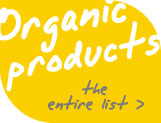
International Organic Trade Fair
| Meaning of ‘Organic’ |
|
|||||||||||
| Organic
agriculture is an ecological production system that nurtures and enhances
biodiversity, biological cycles and soil biological activity. It is
based on minimal use of off-farm inputs and utilizes management practices
that restore, maintain and enhance ecological harmony. Standards that define "Certified Organic" When a grower or processor is "certified organic," it means that a public or private organization which is accredited by the National Accreditation Body (NAB) has verified that the business meets or exceeds the standards set forth in the Indian (National Programme For Organic Production-NPOP) / USA (National Organic Program-USDA-NOP)/ European Organic Rules (Regulation EEC No. 2092/91). This means the farms and facilities have been inspected by the certifying agency and random samples of products, soil and water have been taken and tested. This also means having elaborate internal control systems and documentation. Difference Between "Organic" and "Natural" "Natural" often is used loosely on product labels to mean "healthful," but "natural" only means that the product has undergone minimal processing. Unlike products that are certified organic, natural products have no certification or inspection system. Also, "natural" does not necessarily relate to growing methods or the use of preservatives. Further most of us think of fruits and vegetables when we think of organic products. But there are many other organic foods, including dals, flours, edible oils, tea / coffee, jaggery, cereals, jams, spreads, sauces, soups, chocolate, cookies, meat, poultry, dairy and even wine. Organic foods also taste better than food grown otherwise; hundreds of gourmet chefs across the world agree. Actually, it is easy to understand. Well-balanced soils are naturally prompted to grow strong, healthy plants that taste great. Myths About Organic Farming Being a relatively 'new' idea, organic farming is surrounded by a number of misconceptions both in favour of and against. Some of the more common ones are: |
||||||||||||
|
1. Yields in Organic Farming are lower than chemical farming. Not so. When properly followed, the yields
in Organic Farming are, in the long run, far greater than those
obtained by chemical farming. In horticulture crops, the effects
are even better.
In the case of a chemical farm turning to organic however, there is often a loss in yield and it takes a few years before yields increase and stabilize at a level often higher than that achieved under a chemical regime. It is therefore recommended to convert gradually over a period of three to four years if income from the farm is a key issue. |
||||||||||||
|
2. Organic Farming is not economical. Again, this is not true. While certain practices
such as composting and mulching do entail greater costs on account
of labour, the overall cost of cultivation is usually lower than
chemical farming. However, an important point to note here is
that the farmer has to be self-sufficient in his requirement for
composts and pest control measures. Otherwise money could become
an issue.
|
||||||||||||
|
3. You can't supply enough nutrients by using composts. This is a common argument used to put off Organic
Farming. If one calculates the percentages of nitrogen, potassium
and phosphorous in fertilizers and composts the difference is
indeed vast. Going by these "scientific" calculations,
one may find that in lieu of say 200 kg of mixed fertilizers,
one needs over 30 tons of composts, fairly impossible to supply
two or three times a year. In organic farming however, the concept
of feeding the plant does not exist. The attempt here is to feed
the soil, keep it healthy and living and keep a process in motion.
Much of the work is done by the numerous soil organisms and micro-organisms
that thrive in "living" soils. The various practices
of Organic Farming ensure that soil fertility is maintained and
this symbiotic relationship is kept alive and vibrant.
|
||||||||||||
|
4. The non-use of chemical fertilizers and pesticides is Organic
Farming (or the use of organic manures is Organic
Farming) Not true. While Organic Farming is all about
maintaining soil health, it entails producing the highest yields
possible, in a sustainable, eco-friendly manner using a number
of techniques. Indeed, for any agriculture system to succeed,
it must take a responsibility towards feeding the earth. Organic
Farming entails a lot of hard work and a deep understanding of
Nature and her ways.
|
||||||||||||
| Home |
| About us |
| Organic Living |
| Products |
| Recognitions |
| Photo Gallery |
 |